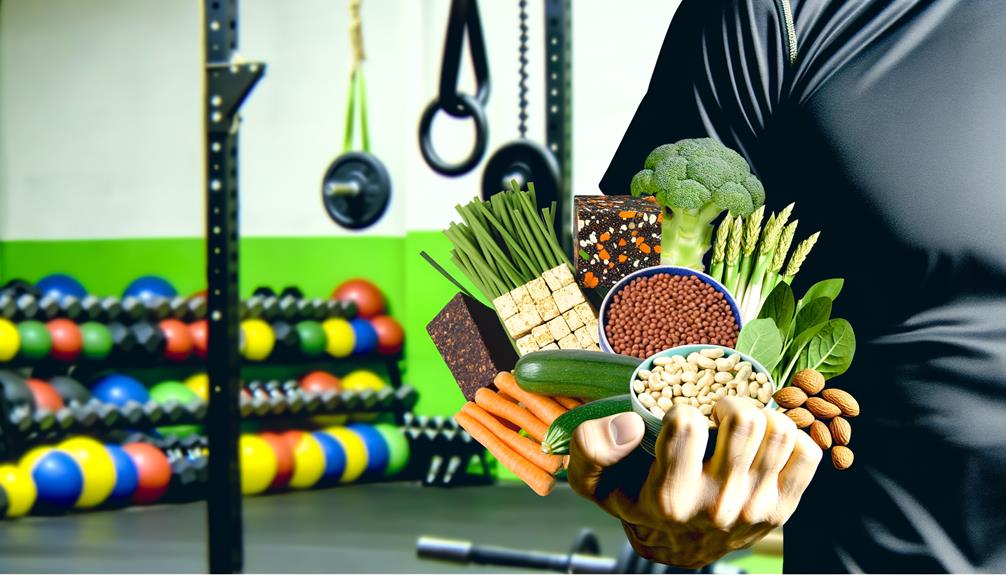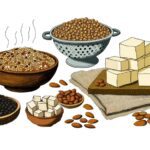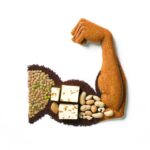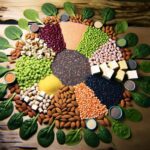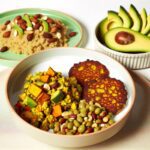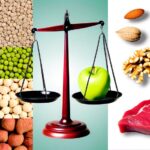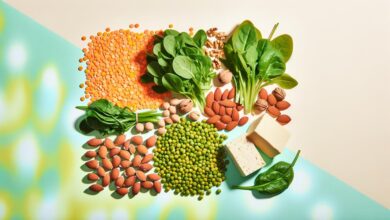Navigating the landscape of muscle building as a vegan is akin to planting a garden in uncharted soil; it requires patience, knowledge, and a keen understanding of the terrain. You've embraced a lifestyle that honors the earth and its inhabitants, and now you're on a quest to cultivate your body's strength using plant-based proteins. While some skeptics might voice concerns about the efficacy of vegan proteins in comparison to animal-based counterparts, contemporary nutrition science offers a cornucopia of options for those who choose the path less trodden by traditional bodybuilders. As you consider the diversity of proteins—from the mighty lentil to the humble pea, each with its unique amino acid profile—you must also be aware of how to strategically combine them to maximize their muscle-sculpting potential. In the journey to optimize your gains, understanding the myths and truths about plant-based proteins becomes a critical step. The question remains: can you truly achieve peak muscle growth by relying solely on vegan protein sources? Join us as we explore the power of plants in not just sustaining but enhancing your bodybuilding endeavors.
Key Takeaways
- Plant-based proteins offer a varied amino acid profile and can support muscle growth.
- Quinoa, amaranth, buckwheat, lentils, black beans, chickpeas, and kidney beans are excellent vegan protein sources.
- Timing protein intake before and after workouts is important for muscle repair and growth.
- Combining different vegan foods can ensure the consumption of all nine essential amino acids for complete proteins.
Understanding Vegan Protein Basics
To effectively build muscle on a vegan diet, it's crucial to grasp the fundamentals of plant-based proteins and their amino acid profiles. Protein is the building block of muscles, and you'll need to ensure you're consuming enough to meet your body's demands. Unlike animal proteins, which typically contain all nine essential amino acids, plant-based proteins often have a varied amino acid profile. It's vital to consume a diverse range of plant proteins to cover all essential amino acids.
Protein digestibility is also key in a vegan diet. This measures how well your body can break down and utilize the proteins you eat. Some plant proteins are less digestible than animal proteins, but you can enhance their absorption. For example, by combining foods like beans and rice, you create a complete protein with an improved amino acid profile.
Top Plant-Based Proteins for Growth
Having established the importance of a varied plant-based diet for essential amino acids, let's explore the top plant proteins that can drive your muscle growth. You're not just fueling your body; you're honoring a tradition of nourishment that respects all forms of life.
Protein-rich grains are a cornerstone in this noble pursuit. Quinoa, a pseudo-cereal, stands out as a complete protein, boasting all nine essential amino acids. Its versatility in dishes from salads to stir-fries makes it a cultural staple across various cuisines. Similarly, amaranth and buckwheat enrich your meals with substantial protein content, and their robust flavors bring a cultural richness to your plate.
Legume varieties are equally crucial. Lentils, with their impressive protein profile, can be the hero in soups and stews, serving your muscles and your taste buds. Black beans, chickpeas, and kidney beans are not only protein powerhouses but also a canvas for a spectrum of flavors, embodying culinary diversity.
Optimizing Protein Intake Timing
Understanding the optimal times to fuel your body with these plant-based proteins can significantly enhance your muscle-building results. The key is to align your protein intake with your body's natural rhythms and protein absorption rates, which vary throughout the day. Nourishing yourself with the right foods at the right times is not just about satiety—it's about providing your muscles with the nutrients they need to grow and repair.
Pre-workout snacks are vital; they prime your body for the demands of exercise. Consider a small, protein-rich snack—like a smoothie with pea protein or a handful of almonds—about 30 minutes before your workout. This timing ensures that amino acids, the building blocks of protein, are available to your muscles when they need them the most.
Post-workout, your muscles are eager to repair and grow, making it an ideal time to consume a protein-rich meal. Aim for a window of 30 minutes to an hour after your exercise session to replenish your body. A lentil salad or a quinoa and black bean bowl can provide a hearty dose of protein to aid in recovery and muscle synthesis.
Combining Vegan Foods for Complete Proteins
While many plant foods contain protein, few provide the complete spectrum of essential amino acids your muscles require, which is why pairing certain vegan foods is crucial for maximizing muscle gain. Embracing the concept of protein pairing in your meals is not just nutritionally beneficial; it's a celebration of the rich tapestry of plant-based foods available to you. Complementary eating is the art of combining various vegan protein sources to ensure you're getting all nine essential amino acids.
Here's how you can practice protein pairing effectively:
- Pair grains like brown rice or quinoa with legumes such as black beans or lentils.
- Enjoy hummus (chickpeas) with whole wheat pita bread for a fulfilling snack.
- Combine nuts or seeds, like almonds or pumpkin seeds, with oats or whole grain cereals.
- Stir pean or hemp seeds into your smoothies or salads for an added protein boost.
This approach not only enhances your muscle-building potential but also invites creativity into your kitchen. You're serving your body the best of what nature has to offer while enjoying a symphony of flavors. Remember, in the spirit of service to your health and the planet, incorporating a diverse range of vegan proteins can lead to both a stronger and a more compassionate world.
Overcoming Vegan Protein Myths
Let's dismantle some of the persistent myths surrounding protein intake in a vegan diet, ensuring your path to muscle gain is rooted in fact rather than fiction. You've likely encountered the common misconception that plant-based proteins are inferior to their animal-based counterparts. This piece of myth debunking is crucial: plant proteins, when consumed in a varied and well-planned diet, can meet and even exceed your nutritional requirements for muscle building.
Plant Protein Perceptions often fall victim to outdated beliefs that suggest a vegan diet can't support significant muscle growth. However, numerous plant-based athletes and bodybuilders have proven that achieving a muscular physique without animal products is not only possible but sustainable. The key is to focus on nutrient-dense whole foods like legumes, grains, nuts, seeds, and soy products, which provide ample protein and essential amino acids.
Frequently Asked Questions
How Does the Body's Response to Plant-Based Protein Differ From Its Response to Animal-Based Protein in Terms of Muscle Synthesis?
Plant-based proteins are like diverse gardens, offering varied amino acids. Your body may require more digestive enzymes to harness their muscle-building potential compared to the more readily utilized animal-based proteins.
Can a Vegan Diet Lead to Any Micronutrient Deficiencies That Could Indirectly Affect Muscle Growth and How Can These Be Addressed?
You might face micronutrient deficiencies on a vegan diet, impacting muscle growth. To combat this, focus on micronutrient supplementation and absorption enhancers, like vitamin C with iron, to nourish your body and serve others.
Are There Any Specific Plant-Based Proteins That Are Known to Enhance Recovery Post-Exercise More Effectively Than Others?
You'll find that pea and rice proteins, rich in essential amino acids, shine in the protein timing arena, accelerating your post-exercise recovery more than other plant-based contenders.
How Does the Fiber Content in Vegan Diets Impact Protein Digestion and Muscle Gain?
You'll find fiber benefits digestive efficiency, slowing protein absorption for steady muscle nourishment. Embrace this plant-based wisdom, nurturing others through sustained energy and healthful, compassionate food choices.
Is There Evidence to Support the Effectiveness of Vegan Protein Supplements Compared to Whole Food Sources for Muscle Gain?
Imagine a powerhouse of nutrients: vegan protein supplements do rival whole foods in muscle building, with studies highlighting similar bioavailability. Yet, consider their cost and the cultural beauty of plant-based meals serving communal health.
